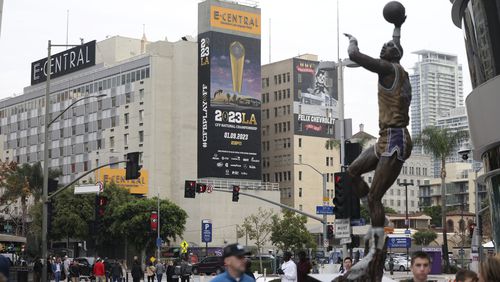In his penultimate NBA game against the nasty Pistons in the 1989 finals, Kareem Abdul-Jabbar scored 24 points. He was 42.
Today the matter of basketball’s best-ever player splits the audience into Team Jordan or Team LeBron, the latter being only a few games from surpassing Abdul-Jabbar as the career scoring leader. For someone who first watched him when he was Ferdinand Lewis Alcindor Jr., repeated mention of the Big Fella has stirred all manner of memories. It also has made me wonder if anyone was – or is, or will ever be – his superior.
Abdul-Jabbar was the greatest high school player ever. Over four years at New York’s Power Memorial, his team lost six games, five when he was a freshman. The other occurred Jan. 30, 1965, when DeMatha Catholic of Hyattsville, Md., won 46-43 before a sellout crowd of 12,500 in College Park. The loss snapped Power’s 71-game win streak. DeMatha was coached by the legendary Morgan Wootten. Its best players – Bob Whitmore and Sid Catlett – starred at Notre Dame.
He was the most famous recruit ever. On May 4, 1965, he chose UCLA over Michigan. Those schools played for the 1965 NCAA title five weeks earlier.
He was the best freshman ever. UCLA tradition was to stage a preseason game between the varsity Bruins and the frosh, known as the Brubabes. (Freshmen weren’t eligible for varsity play.) The 1965 game marked the opening of Pauley Pavilion. It aired live on L.A. TV. The varsity, coming off consecutive national titles and ranked No. 1 in preseason polls, lost 75-60. Abdul-Jabbar scored 31 points and took 21 rebounds.
He was the greatest collegiate player ever. When he enrolled, the belief was that the Bruins would win three consecutive NCAA titles. They did. In his first varsity game, he scored 56 points against USC. In his last, he scored 37 against Purdue. UCLA went 88-2 over three seasons.
He changed the college game, Part 1. In the attempt to keep UCLA from utter domination, the NCAA banned the dunk after his sophomore season. It had no effect on the intended target. He had developed another shot in high school. His skyhook, often delivered downward at the basket, became his trademark.
He changed the college game, Part 2. On Jan. 20, 1968, No. 1 UCLA played No. 2 Houston in front of 52,693 in the Astrodome. The game aired on the syndicated network TVS. Before that night, college basketball was seen as a regional sport. This took it nationwide. Houston won 71-69, ending the Bruins’ 47-game win streak. Elvin Hayes scored 39 points. Coming off a scratched cornea eight days earlier, Abdul-Jabbar scored 10, missing 14 of 18 shots.
He was part of the finest performance the sport has seen. After the loss in Houston, Sports Illustrated featured Hayes shooting over him on its cover. The headline: “Big EEEE over Big Lew.” Abdul-Jabbar taped the cover inside his locker. When the teams met again in the Final Four, UCLA won 101-69. Hayes scored 10 points. SI’s cover the next week showed Abdul-Jabbar shooting over the Big E. The headline: “Lew’s revenge – the rout of Houston.”
He was the most heralded rookie ever. He appeared on SI’s cover five times as a collegian. He graced its front three more times in his first pro season. He was drafted by Milwaukee, which won a coin flip – Phoenix called heads, wrongly – for the No. 1 pick. With him, the Bucks improved from 27-55 to 56-26. They would win the NBA title in his second season.
He was the most consistent player ever. He played 20 NBA seasons. He made the All-Star team 19 times. The exception was in 1977-78, when Kent Benson elbowed him in the gut. (The rookie was dealt a punch to the face, which resulted in a broken hand and two missed months for Abdul-Jabbar.) He was part of six championships, the final five as a Laker. He was voted MVP six times. He was finals MVP at ages 24 and 38. He averaged at least 20 points over his first 17 seasons, by which time he was 39.
He has been the NBA’s all-time leading scorer since passing Wilt Chamberlain on April 4, 1984. LeBron James would be born eight months, three weeks and five days later.







